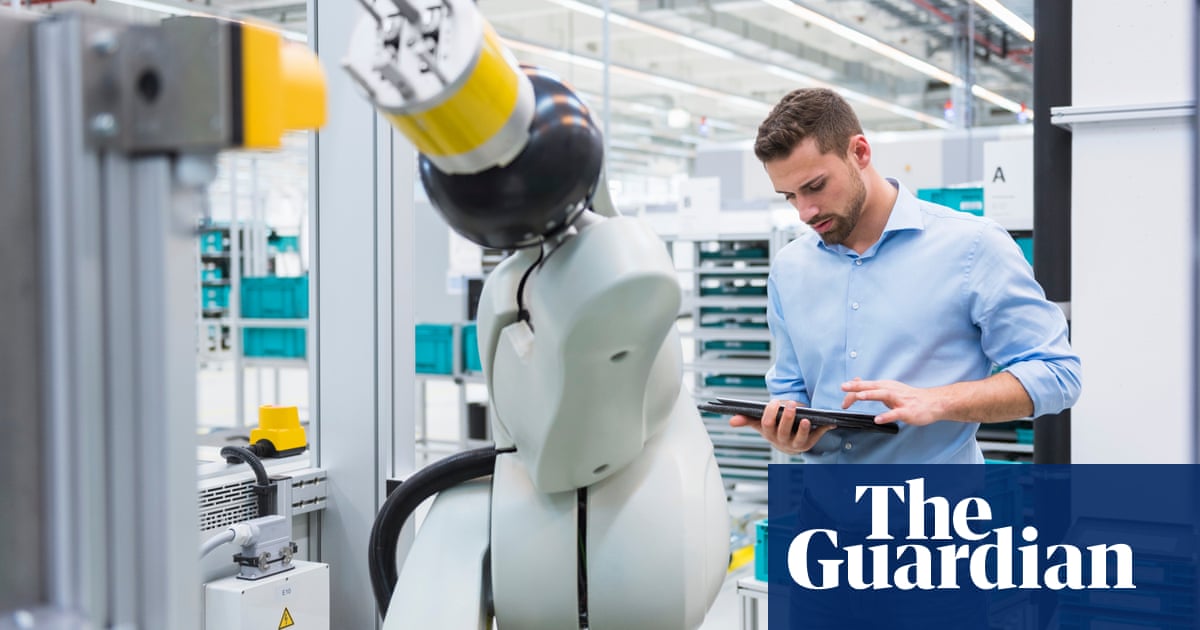
The adoption of artificial intelligence (AI), robotics and automated equipment has an overall positive impact on jobs, new research has found, with more than three-quarters of firms reporting that use of the technology had created new roles within the company and the majority reporting that job quality had improved.
More than 1,000 UK firms were asked about their adoption of the new technologies during the past three years, in research by the Institute for the Future of Work (IFOW), Imperial College London and Warwick Business School. More than 860 confirmed they were using AI and other automated technology, with 78% of those companies reporting this had resulted directly in the creation of new jobs.
Technologies also increased the need for new skills, reported 83% of businesses, while 69% said they believed they improved job quality either a little or a lot.
“This report not only highlights that the adoption of AI is well under way across UK firms, but also that it is possible for this tech transformation to lead to both net job creation, and more ‘good work’ – great news as we try to solve the UK’s productivity puzzle,” said Anna Thomas, director of IFOW.
The report’s findings appear to be at odds with concerns about the possibility of AI-induced job losses, and with what the document describes as “dramatic, speculative headlines about artificial intelligence (AI) and autonomous robots”.
Prof James Hayton, lead author of the report, said: “At least from a research perspective, the story is already changing. The challenge is that it’s not quite so interesting to say ‘well, robots are taking our jobs sometimes, but it depends’, as it is to say ‘in 30 years there will be no jobs at all’.
“The evidence we really have about this is that technology tends to create new jobs and upskill jobs. Yes, it does downskill and disrupt other jobs, but in the long run, there tends to be a positive impact on the economy.”
While 47% of respondents said AI and automation had eliminated positions within their company, almost 67% reported the technology had created new positions.
The report, which was prepared by the Pissarides Review into the Future of Work, with funding from the Nuffield Foundation, found equal rates of adoption among businesses for both physical and non-physical tasks.
Despite the positive responses from businesses, the report said the pace at which automation was spreading through the labour market could – if not properly addressed – exacerbate regional inequalities across the UK and lead to “serious erosions in job quality”.
“This technology will spread broadly and rapidly through the economy, and therefore we would expect an equally rapid impact on some jobs,” Hayton said. “Society will have to adjust quickly to these issues, quicker than we’ve ever had to adjust before.”
Whether adopting technology has a positive or negative impact on workers depends on what is known as regional innovation readiness – the levels of investment in a particular region, and the levels of education among that region’s workers, said the report.
“In the context of the levelling up agenda, we know there are regions that do much better, such as the south-east and London, and also the second and third cities in these regions,” said Hayton. “This is compared to, say, the far south-west or far north-west. In our study, it’s quite clear that these regions have a lower level of readiness in terms of investment in education and investment in technology infrastructure.”
To help insure against these negative outcomes, the report urges firms and policymakers to focus on human resource practices which invest in workers, and which focus on augmenting their capabilities through automation, rather than replacing them.
“The more you invest in your workforce, the more likely they are to be able to successfully utilise these technologies, because they’ve got more skills,” Hayton said. “They’re more flexible, more willing to learn, more confident that you’re not going to fire them. And, therefore, it’s going to be easier to successfully implement the new technology.”












